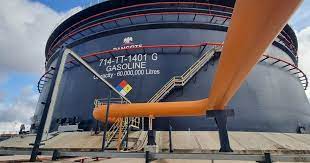
In a promising forecast, the International Energy Agency (IEA) anticipates that the Dangote Refinery, boasting an impressive daily capacity of 650,000 barrels, is set to catalyze substantial growth in oil demand during the forthcoming decade. This projection holds immense significance for African nations, particularly those currently reliant on imported refined energy products.
This is according to the IEA’s October 2023 World Energy Outlook report.
A part of the Outlook stated, “African countries rely on imports of refined products, although a new 650 000 barrels per day refinery in Nigeria helps meet incremental oil product demand growth in the next decade.”
Note that currently, many African nations are dependent on imported refined products. However, the Dangote refinery has the potential to reshape this scenario.
In the IEA’s World Energy Outlook, it emphasised that Africa is currently producing approximately 7 million barrels of oil per day, with about 40 percent of it being exported.
Also, the Outlook underscored that oil production is expected to decline, primarily because there are limited new oil discoveries coming online that can counterbalance the decreases from existing producing fields.
This situation underscores the importance of efficient, local refining capacity like the Dangote refinery to meet the growing demand for oil products and reduce import dependence.
Meanwhile, the Dangote refinery, which was commissioned earlier this year, is yet to begin operations, according to sources familiar with the matter.
Despite Dangote Group Executive Director Devakumar Edwin’s earlier assurance in September 2023 that the refinery would commence diesel and aviation fuel production in October, there are now indications that these plans might not come to fruition as expected.
Sources with knowledge of the situation suggest that the refinery could potentially miss the deadlines set by Edwin, which included diesel and aviation fuel refining by October 2023 and petrol refining by November 2023.
The exact reasons for these potential delays have not been disclosed, leaving the situation shrouded in uncertainty.
At the time of this report, attempts to contact the management team at Dangote Refinery have proven unsuccessful.
This uncertainty raises questions about the refinery’s operational timeline and the factors contributing to any potential setbacks.
It also emphasises the challenges and complexities involved in establishing and commencing operations at such a significant industrial facility.















